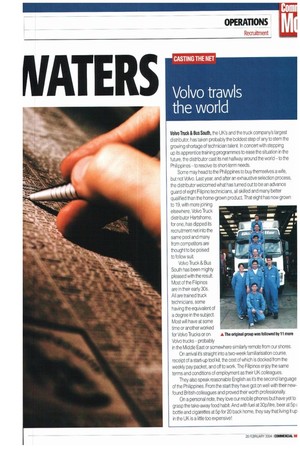FISH NG FRESH 1 IVATERS
Page 64

Page 65

If you've noticed an error in this article please click here to report it so we can fix it.
Workshop technicians are as thin on the ground as drivers.
Andy Salter looks at initiatives from Mercedes-Benz and Volvo which have effectively plugged their skills gaps...
Wherever you look in the road transport industry there's a skills shortage, be it drivers, senior managers or in the workshop. Any company with a stake in the transport sector has to address the key question: how do you make the road transport industry more attractive and entice new recruits into the sector? We're all familiar with the rhetoric of working in an essential industry, providing a key service for the economy and all that... But the prospect of long hours. low pay, pressurised conditions and being expected to work in tough and, sometimes, dirty conditions tends to act against the business.
Taking action
To borrow a phrase, however,the times they are a-changing"The Working-lime Directive,often seen as a great ogre by this business, means that the days of drivers doing 12-hourplus shifts should be a thing of the past. In the workshop, truck maintenance is no longer the oil-and-spanners job it once was and today's workshop technician needs lo be equally at home in front of a computer as an engine.
Recognising the latter. Mercedes-Benz has developed a straightforward approach to address the shortfall in workshop personnel."In 2002 we had 1,010 technicians in the network." says Stuart Radford, head of training at Mercedes-Benz. "By 2005 we have predicted we will need an additional 400 new recruits. However, we have a 20% turnover of staff, so within that time period we will, theoretically, need to replace all of them!"
The Mere human resources department set about tackling the problem: "We looked at the industry in-depth." Radford explains. "It was clear we could either poach technicians from others, or grow our own. We decided on the latter and launched a major apprentice recruitment drive in 2003, targeting 6,000 schools, colleges and careers offices." The team also attended 57 careers fairs, 13 dealer open days and attracted nigh-on 100,000 visitors to the company website, in addition to using magazine recruitment ads. "As well as trade magazine advertising we targeted the 'lads' magazines such as Loaded, Top Gear and FH M," says Radford."Mixing sex and motors is a combination tried by plenty in the past — we thought we'd give it a go."
The success has been phenomenal, with more than 3,000 applicants responding to the ads.That's only the first step, however.The biggest challenge is to convert enquiries into actual apprentices, and here Mercedes can claim another success. Of those applicants 291 had passed the first test by the back end of last year. more than 100 are already placed on the scheme and over 1,100 test dates have been set.
Indeed, the initiative was so over-subscribed that Mere was able to direct its surplus toward other companies."We ended up doing the industry a major service in recruiting new blood.The better people we can get into our business the better the service will be for all our customers." Radford concludes. •






























































































































































































